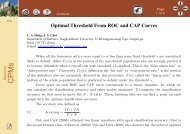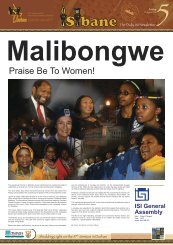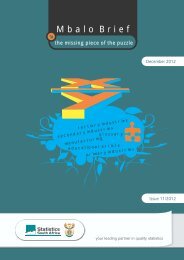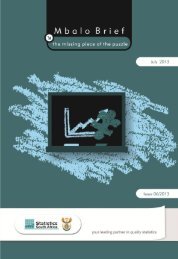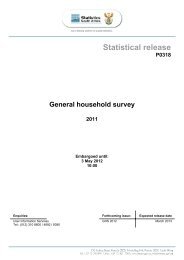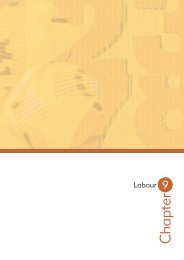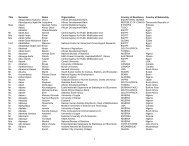Post-enumeration Survey (PES) - Statistics South Africa
Post-enumeration Survey (PES) - Statistics South Africa
Post-enumeration Survey (PES) - Statistics South Africa
You also want an ePaper? Increase the reach of your titles
YUMPU automatically turns print PDFs into web optimized ePapers that Google loves.
<strong>Statistics</strong> <strong>South</strong> <strong>Africa</strong><br />
1<br />
1. INTRODUCTION<br />
1.1 Background<br />
<strong>South</strong> <strong>Africa</strong> conducted its third post-1994 population census in October 2011. A population census is a<br />
total count of the country's population, where demographic, social and economic information is collected<br />
about the people who live in the country. The census yields a wealth of valuable information for<br />
analysing changes in the socio-demographic profile of the population, and for monitoring, planning, and<br />
decision-making at national and local levels, by government, business and the general community. It is<br />
also integral to the derivation of reliable post-censal population estimates and for charting future<br />
demographic trends.<br />
Given the strategic significance of the census data and its diverse applications, Stats SA makes<br />
concerted efforts to ensure the universal coverage of its ten-yearly census. Yet, in such a large and<br />
complex exercise, it is inevitable that some people will be missed and some will be counted more than<br />
once. Some of the reasons why people may be missed include the following:<br />
• they were travelling and were difficult to contact;<br />
• they mistakenly thought they were counted elsewhere;<br />
• there was insufficient space on the census questionnaire in the household where they were staying<br />
and they did not obtain additional questionnaires;<br />
• the person completing the questionnaire thought that, for example, young babies, the elderly or<br />
visitors should not be included;<br />
• they did not wish to be included due to concerns about the confidentiality of information or a more<br />
general reluctance to participate;<br />
• the dwelling in which they were residing was missed because it was difficult to find (e.g. in a remote<br />
or non-residential area);<br />
• the dwelling in which they were residing was mistakenly classified as unoccupied; and<br />
• lost questionnaires or questionnaires that could not be processed.<br />
Some of the reasons why people are counted more than once include the following:<br />
• they were included on the census questionnaire at the dwelling where they usually live, even though<br />
they stayed and were counted elsewhere on census night (i.e. failure to apply the de facto rule<br />
accurately); and<br />
• they were out of the country on census night and so should not have been counted at all, but were<br />
included on the census questionnaire at the dwelling where they usually live.<br />
<strong>Post</strong> Enumeration <strong>Survey</strong> (<strong>PES</strong>)



